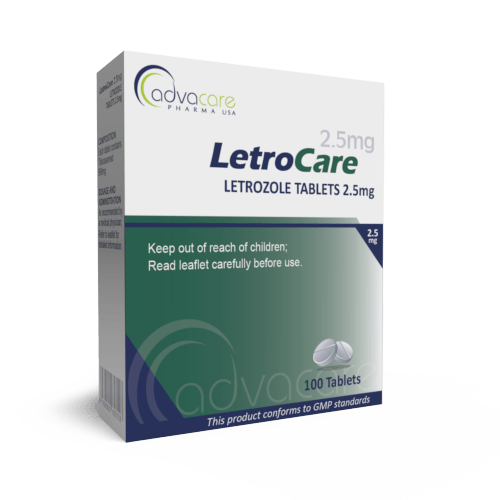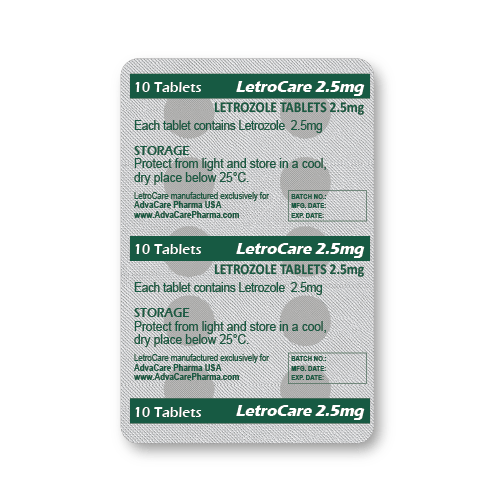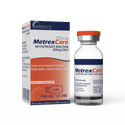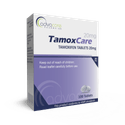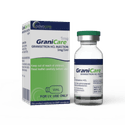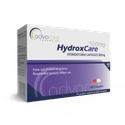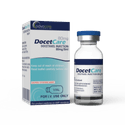- Home›
- Pharmaceuticals›
- Oncology Products›
- Oncology Tablets›
- Letrozole Tablets
Letrozole Tablets
Dosage
Packaging
What is Letrozole?
Active Ingredients: Letrozole
Letrozole Tablets are an antineoplastic drug used to treat hormone-sensitive types of breast cancer in postmenopausal women. This medicine is typically prescribed to women who have taken tamoxifen for 5 years. Letrozole is also often used after radiation or surgery in order to prevent relapse.
Letrozole is approved for use in post-menopausal women, but there has been some use of this drug for the treatment of cancer in men. It is sometimes prescribed in the treatment of male breast cancer or the long-term management of endometrial stromal sarcomas.
Letrozole is sometimes used for the treatment of hormone-related problems. In some countries, letrozole may also be used as a fertility treatment, as it helps with ovarian stimulation. It Is also sometimes prescribed to treat precocious puberty in children. There have been studies and reports on the use of letrozole for treating conditions such as gynaecomastia and endometriosis. Due to its antiestrogen activity, there is some use during the pretreatment of pregnancy termination in combination with misoprostol.
Letrozole is listed on the World Health Organization's List of Essential Medicines.
Letrozole is a nonsteroidal aromatase inhibitor. The active ingredient decreases the amount of estrogen the body makes. As some types of cancer cells need estrogen to spread, this action helps slow down growth and inhibit the development of new cancer cells.
Letrozole Tablets are produced with a dosage of 2.5mg. They are packaged in blisters and available as a box of 100 tablets.
AdvaCare Pharma is a trusted global supplier of Letrozole Tablets. We offer a wide range of high-quality and cost-effective oncology medications that are available for distribution. Our factories are GMP-certified and meet the high standards necessary to comply with WHO guidelines and standards.
Why are we a trusted Letrozole manufacturer?
AdvaCare Pharma manufactures Letrozole Tablets, one of 40+ oncology treatments, according to rigorous GMP protocols at our state-of-the-art production facility. We are committed to producing quality-assured, cost-effective cancer treatments that meet the highest industry standards and are readily available to cancer patients worldwide. As an established Letrozole manufacturer, we supply pharmaceutical distributors, hospitals and government institutions with reliable cancer drugs.
Uses
What is Letrozole used for?
It is primarily used to treat certain types of hormone-sensitive breast cancer in postmenopausal women. It’s used for:
- adjuvant treatment of early breast cancer
- extended adjuvant treatment of early breast cancer
- first and second-line treatment of advanced breast cancer
- treatment of advanced breast cancer disease progression following antiestrogen therapy
This drug has also been used for the:
- hormone-receptive positive breast cancer in male patients
- advanced, estrogen receptor-positive, HER2-negative breast cancer in postmenopausal women
- salvage therapy for metastatic, hormone receptor-positive, HER2-positive breast cancer in postmenopausal women
- recurrent, epithelial ovarian cancer
Letrozole is sometimes used as a fertility treatment for women with polycystic ovary syndrome. It is also occasionally used to delay puberty in children with precocious puberty.
How should Letrozole Tablets be used?
This medication is manufactured to be taken orally. It should be taken at about the same time every day. This medication may be taken with or without food.
These tablets should be handled carefully, as this drug can be absorbed through the skin and lungs. Be sure to wash your hands thoroughly after touching the tablet. For extra precaution, those who are not using this medication should use gloves and a mask when handling the tablet.
For full treatment, it may be necessary to take the tablet every day for a prolonged period, ranging from anything from months to years.
How should Letrozole Tablets be stored?
These tablets should be kept in their original blister packs until use. Store the medication at room temperature in a location that is free of moisture and heat.
What dose should be taken?
Adult Dosing Dosage may vary based on different medical indications:
- For breast cancer (locally advanced or metastatic) in postmenopausal women, the usual dose is 2.5mg, taken once per day.
- For breast cancer (advanced or progressive) in postmenopausal women, the usual dose is 2.5mg, taken once per day.
- For the adjuvant treatment of breast cancer (hormone receptor-positive early disease) in postmenopausal women, the usual dose is 2.5mg, taken once per day.
- For the extended adjuvant treatment of breast cancer (hormone receptor-positive early disease) in postmenopausal women, the usual dose is 2.5mg, taken once per day. Treatment should start after 5 years of tamoxifen treatment.
- For ovulation induction, the usual dose is 2.5-5mg, taken once a day for 5 days. Treatment should start on the third day of the menstrual cycle.
Renal Dosing Dosing adjustment guidelines for patients with renal impairment are as follows:
- CrCl > 10: No adjustment is necessary.
- CrCl < 10: Not defined.
Hepatic Dosing For patients with cirrhosis or Child-Pugh Class C, medicine should be given every 48 hours.
Pediatric Dosing For precocious puberty in children over 2 years old, the usual dose is 2.5mg, taken once per day. Treatment can be started for either female patients with McCune-Albright syndrome or male patients with testotoxicosis.
Renal and hepatic dosing guidelines are not defined for pediatric patients. It is recommended to consider the adult guidelines for adjustments.
Refer to a doctor or pharmacist for guidelines on dosage. Do not exceed what they advise. It is important to note that institution protocols and the packaging insert should be reviewed prior to prescribing this medication.
What happens if a dose is missed?
The dose should be taken as soon as possible. If it is almost time for the next dose, the missed dose should be skipped. Never take more than one dose at the same time.
Who can use Letrozole?
Letrozole Tablets can be given to adults and children, but caution is advised for specific groups of patients.
Pregnant The use of letrozole is contraindicated for pregnant women. Based on animal data, there is a risk of teratogenicity, embryo-fetal toxicity, and death at 0.1x the maximum recommended human dose (MRHD). Based on limited human data, the risk of fetal harm is not expected when used for ovulation induction; however, some countries do not approve this usage out of caution.
It is advised to conduct a pregnancy test before beginning treatment with letrozole. An effective form of birth control should be used during treatment and for the 3 weeks after the last dose of this medicine.
Breastfeeding It is advised to avoid breastfeeding while undergoing treatment with letrozole and for 3 weeks after the last dose. No human data is available, but there is a possible risk of infant harm based on the drug’s mechanism of action. There is no human data available to properly assess letrozole’s effects on milk production.
Children Appropriate studies to assess the safety and efficacy related to age have not been performed. Very limited human data exists for this population, though there is an off-label use of letrozole to treat adolescents and children over 2 for conditions such as constitutional delay of growth and puberty (CDGP), precocious puberty (McCune-Albright syndrome), and idiopathic short stature.
Geriatric There have not been appropriate studies conducted to examine problems specific to this population. It should be noted that elderly patients are typically more prone to experiencing adverse effects, and dose modifications may be necessary for some people in this population.
Other warnings
For patients with renal impairment, this medicine should be used cautiously.
For patients with hepatic impairment, the lowest dosage should be used, as the effects of this medication on this population of cancer patients have not been examined.
This drug may increase total serum cholesterol. It is recommended to consider monitoring cholesterol during treatment.
It is advised to consider monitoring bone mineral density during treatment because Letrozole is associated with decreased bone mineral density, leading to an increased risk of osteoporosis.
The concurrent use of estrogens should be avoided.
Side Effects
As with all pharmaceuticals, some unwanted effects can occur from the use of Letrozole Tablets.
Common side effects include, but may not be limited to:
- dizziness
- dry skin
- fatigue
- headache
- hot flashes
- hair loss
- increased sweating
- muscle pain
- pain in bones and joints
- vaginal bleeding
Seek medical attention if the following develop:
- chest pain
- difficulty breathing
- fainting
- mouth ulcers due to infection
- rapid heart rate
- severe fever
- chills
- severe persistent blurred vision
- sudden chest pain
- swelling of the face and throat
- yellow skin and eyes
For a comprehensive list of all possible effects, consult a doctor.
If any symptoms persist or worsen, or you notice any other symptom, then please call your doctor immediately.
Precautions
Do NOT use Letrozole Tablets if:
- You are allergic to letrozole or any of the other ingredients in the tablet.
- You have not yet started menopause.
There are many known interactions between letrozole and other drugs, such as tamoxifen and medicines containing hormones. Before beginning treatment with letrozole, consult with your doctor about any medications, supplements, and herbal products you are taking.
To make sure treatment with letrozole is safe for you, inform your doctor if you have any health conditions, such as:
- liver disease, such as cirrhosis
- osteoporosis or osteopenia (low bone mineral density)
- high cholesterol (hypercholesterolemia)
- pregnancy or breastfeeding
The use of this medicine during pregnancy or breastfeeding should be avoided. Consult a doctor or healthcare professional before using letrozole.
Driving or operating machinery should be avoided, as the medication may cause dizziness and drowsiness.
References
A Comparison of Letrozole and Tamoxifen in Postmenopausal Women with Early Breast Cancer
This study compares letrozole with tamoxifen as adjuvant treatment for steroid-hormone-receptor–positive breast cancer in postmenopausal women.
This double-blind trial compared five years of treatment with various adjuvant endocrine therapy regimens in postmenopausal women with hormone-receptor-positive breast cancer. It included patients who received letrozole, letrozole followed by tamoxifen, tamoxifen, and tamoxifen followed by letrozole.
In this study, 8,010 women with assessable data were enrolled; 4003 in the letrozole group and 4007 in the tamoxifen group. Over a median follow-up of 25.8 months, there were 351 events in the letrozole group and 428 events in the tamoxifen group, resulting in five-year disease-free survival estimates of 84.0 percent and 81.4 percent, respectively. Compared to tamoxifen, letrozole significantly reduced the risk of events leading to the end of disease-free survival periods (hazard ratio, 0.81; 95 percent confidence interval, 0.70 to 0.93; P=0.003), particularly the risk of distant recurrence (hazard ratio, 0.73; 95 percent confidence interval, 0.60 to 0.88; P=0.001). Thromboembolism, endometrial cancer, and vaginal bleeding were more prevalent in the tamoxifen group, while women receiving letrozole had a higher incidence of skeletal and cardiac events as well as hypercholesterolemia.
The conclusion of this research is that in postmenopausal women with endocrine-responsive breast cancer, adjuvant treatment with letrozole reduces the risk of recurrent disease.
You might be interested in...
Why AdvaCare Pharma?
As an industry leader, we are aware of our responsibility to provide affordable and sustainable solutions to improve healthcare worldwide.
